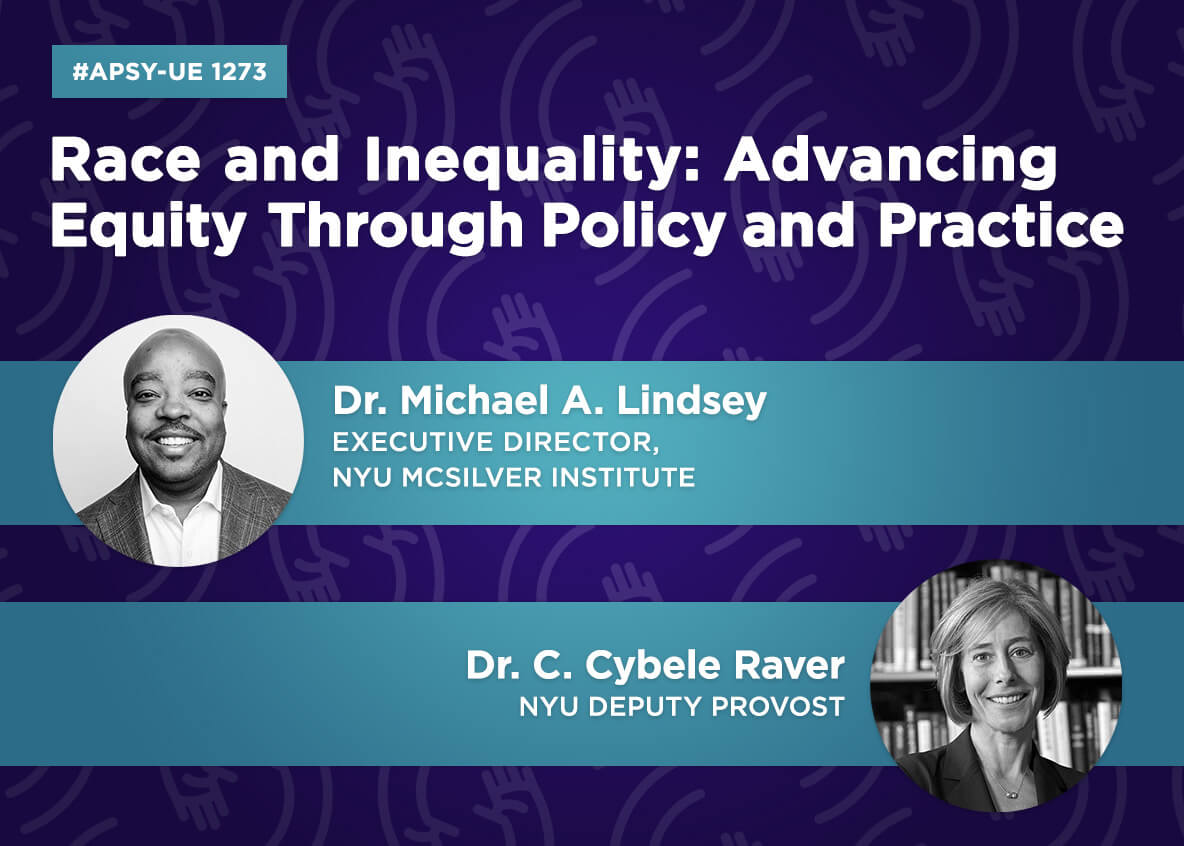Back to the NYU McSilver Home
2021 Annual Report
This report is also available as a printable PDF document.
Message from the Executive Director
From Michael A. Lindsey, PhD, MSW, MPH
Dear Friends,
Emerging technologies helped to propel NYU McSilver in 2021 toward a new horizon as we continue our mission to disrupt poverty and inequity.
Our mission has taken on greater-than-ever urgency during the COVID-19 pandemic, and the way that we work has evolved to meet the demands of a rapidly-changing landscape for youth-centered services, behavioral health research and social justice policy.
The establishment of The AI Hub at McSilver this year marks the most significant expansion of our work since our founding. The singular vision shown by our founder Dr. Constance McCatherin Silver, when she established NYU McSilver in 2007, continues through the $5 million gift she and her husband Martin Silver made to fund the Hub in June.
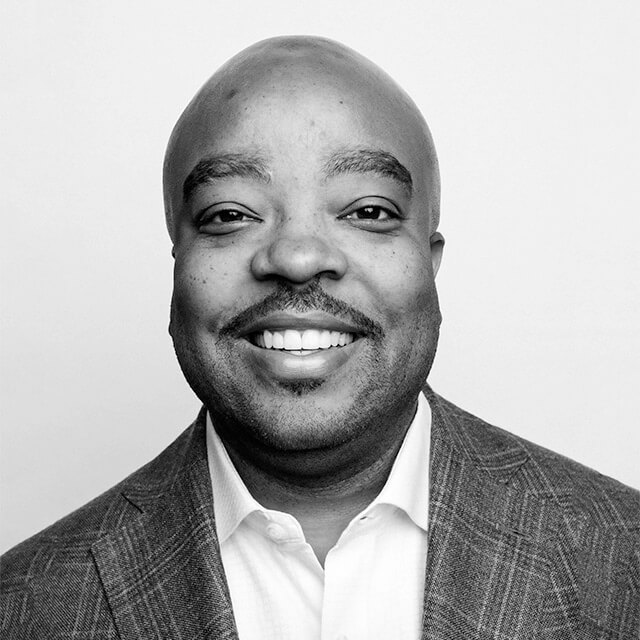
The Hub will enable us to investigate how artificial intelligence-driven (AI) systems can be used to equitably address poverty and challenges relating to race and public health, and to provide thought leadership on the implications. Through it, we will advocate for methods and policies that do not perpetuate inequities for people in underserved and marginalized populations. The Hub will also advance our existing research into Black youth mental health trends and interventions by enabling the use of predictive analytics to address the potential for suicide and self-harm, before the worst happens.
Further, the Hub will allow us to engage tool developers, community members, scholars, clinicians and policymakers in critical discussions about ensuring that AI-driven systems do not perpetuate or magnify existing racial inequities in society. We have already begun the discussion with an experts forum about predictive risk modeling in child welfare practice that we co-hosted in November with Fordham University’s Graduate School of Social Service.
Meanwhile, telehealth and other teleservices enabled us to keep connecting with young people and their families, as well as community members and social service providers, despite the challenges presented by the COVID-19 pandemic. Our Technical Assistance Centers, Clinical Education and Innovation Department, Step-Up program and researchers were all able to continue their important work, as a result.
Also, our Community Technical Assistance Center of New York (CTAC) contract was awarded a multi-year addition for the Youth ACT Technical Assistance Center (YTAC), to provide training and technical assistance to 14 New York State providers who will be the first to implement an Assertive Community Treatment (ACT) program for children. Our statewide Technical Assistance Centers CTAC and Managed Care Technical Assistance Center (MCTAC) also made it easier for behavioral health providers and the public to access a robust library of trainings and resources through the relaunch of CTACNY.org. The NYC Early Childhood Mental Health Training and Technical Assistance Center (TTAC) launched TTACNY.org to support providers in its space.
As well, our focus on equity in emerging technologies extended into urban mobility. Our 2020-2021 Fellow-in-Residence Henry L. Greenidge provided critical thought leadership for how to ensure that Black and brown communities have the equitable access to mobility and jobs as transportation systems move toward autonomous vehicles.
New methodologies came to New York City municipal elections in 2021, with voters casting ballots under a new ranked-choice voting system, and NYU McSilver responded with a voter education outreach campaign of webinars, media interviews and op-eds, in partnership with the Committee for Ranked Choice Voting NYC.
We also hosted community engagement forums on other topics with elected officials such as New York Attorney General Letitia James, U.S. Representatives for New York Gregory Meeks and Adriano Espaillat and State Senator Brian Benjamin; and we were involved in the moderation of a mayoral candidates forum. Community organizations such as the Greater New York Chapter of The Links Inc., Boys and Girls Club of Harlem and The Haitian Roundtable partnered with us in these forums.
Central to our work is our research into suicide behaviors and mental health trends in Black youth, Latinx youth and families living with poverty. In May we received federal funding to study a novel child maltreatment intervention named Safe Mothers Safe Children (SMSC) in a randomized controlled clinical trial. The study will receive funding of $3.5 million over 5 years from the Eunice Kennedy Shriver National Institute of Child Health and Human Development, one of the National Institutes of Health.
Meanwhile, research we led or were involved in made news headlines after being published in Prevention Science, Academic Pediatrics and the Journal of the American Academy of Child and Adolescent Psychiatry. In September we also provided a platform for people touched by child suicide — a survivor, a surviving parent, researchers and clinicians — through our podcast with the Central East Mental Health Technology Transfer Center, titled Saving Young Black Lives: Reversing Suicide Trends.
I’m also proud to report that our policy advocacy in this space reached an important milestone in May when the U.S. House of Representatives passed H.R. 1475, the Pursuing Equity in Mental Health Act on a bipartisan basis. The legislation was co-sponsored by U.S. Representatives Bonnie Watson Coleman (D, NJ-12th) and John Katko (R, NY-24th), following months of work by the Congressional Black Caucus Emergency Taskforce on Black Youth Suicide and Mental Health, including a report developed by a working group of experts that I had the pleasure of leading. The bill authorizes $805 million in grants and other funding, and we are hopeful that the Senate version, sponsored by U.S. Senator Bob Menendez (NJ), will pass as well.
As you can see, we enter 2022 buoyed by solid progress during extremely challenging times for our society and the people whose lives we strive to improve. Please join me in thanking the NYU McSilver staff for their tireless work in a time of great need. We welcome your support and partnership as we head toward a promise-filled horizon.
Sincerely,

Michael A. Lindsey, PhD, MSW, MPH
Executive Director
NYU McSilver Institute for Poverty Policy and Research
Aspen Health Innovators Fellow, The Aspen Institute
Our Impact
Our impact is wide-ranging, touching thousands of people each year through research, programming, policy advocacy, community forums and technical assistance training.

Through technical assistance training in 2021, including over 332 events, NYU McSilver reached 710 organizations representing an audience of 11,178 participants, providing training and technical assistance to 63 percent of all New York State mental health and substance use organizations.

Since 2011, through 1,879 events, we have reached 1,192 organizations representing an audience of 44,880 participants, providing training and technical assistance to 77 percent of all New York State mental health, substance use and individuals with developmental disabilities organizations.
Learn more about our community co-sponsored events and forums, as well as our latest podcast series and the publications and presentations that carried our expertise.
History & Mission
Where McSilver has been and where we’re headed
The NYU McSilver Institute for Poverty Policy and Research is committed to disrupting generational poverty through research, policy and action.
Established in 2007, the Institute is the brainchild of Dr. Constance McCatherin Silver, a New York University alumna and trustee who was determined to establish a top-notch research institute to not only contribute to the intellectual discourse, but to also find solutions that would disrupt generational poverty in communities most affected by inequality and injustice.
NYU McSilver recognizes the interrelatedness of race and poverty and is dedicated to dismantling structural racism and all forms of systemic oppression. We collaborate with community stakeholders, policymakers and service organizations to ensure our work is culturally and contextually appropriate.
Over the years our research has recognized the importance of health and social equity to disrupting poverty. Accordingly, our areas of focus include child and family mental health, food security and addressing social determinants of health.
Our policy work builds on our research, informing efforts at the local, state and federal level to address and end social, economic and health-related inequity.
Meanwhile, our technical assistance and training services touch providers of services to youth and families throughout New York State and beyond. Since 2011, we have provided training and technical assistance to 77 percent of all organizations in New York State that provide services for behavioral health, substance use and individuals with developmental disabilities, reaching an audience of nearly 45,000 individuals.
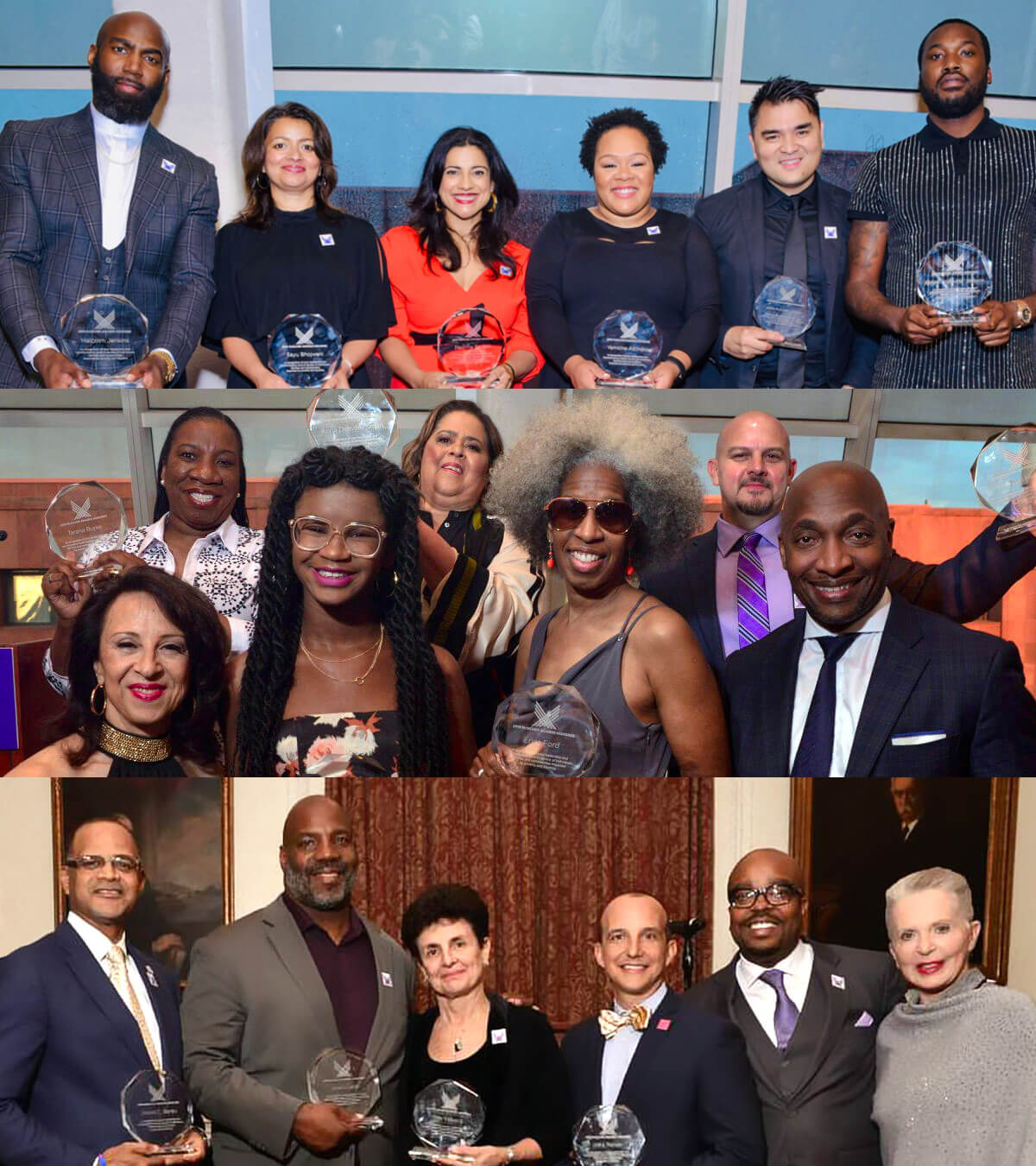
We also have recognized the importance of honoring those who lead the way in addressing inequity. In 2013 we launched the McSilver Awards to recognize Vanguards for Social Justice who are prominent in their fields and unafraid to use their platforms to help create a more equitable and just world. Recipients of past McSilver Awards include Yamiche Alcindor, David Banks, Sayu Bhojwani, Tarana Burke, Jelani Cobb, Anna Deavere Smith, Erica Ford, Maria Hinojosa, Malcolm Jenkins, Ana Oliveira, Reshma Saujani, Reverend Al Sharpton, Jose Antonio Vargas and Robert “Meek Mill” Williams.
In 2017, NYU McSilver was selected to lead the university-wide Strategies to Reduce Inequality (SRI) initiative. We lead a team encompassing 80 faculty affiliates and 16 research centers across NYU’s schools and disciplines who are studying inequality. In 2019, SRI launched an Inequality Minor course of studies in collaboration with Silver School of Social Work, and established the New York City Reducing Inequality Network (NYC-RIN) initiative for doctoral students at NYU, Columbia University and the City University of New York.
NYU McSilver’s research and policy work relating to Black youth mental health reached critical mass in 2019, when the Institute led the working group of experts for the Congressional Black Caucus Emergency Taskforce on Black Youth Suicide and Mental Health, through our Executive Director, Dr. Michael A. Lindsey. The working group produced the seminal report, Ring the Alarm: The Crisis of Black Youth Suicide in America, which informed a companion bill introduced by that taskforce’s chair, U.S. Representative Bonnie Watson Coleman (NJ-12th).
Similar policy advocacy in New York State resulted in a bill that passed the state legislature but was not signed into law. Meanwhile, the journal of the American Academy of Pediatrics published widely-cited research led by Dr. Lindsey into suicide behaviors that revealed troubling trends in Black youth.
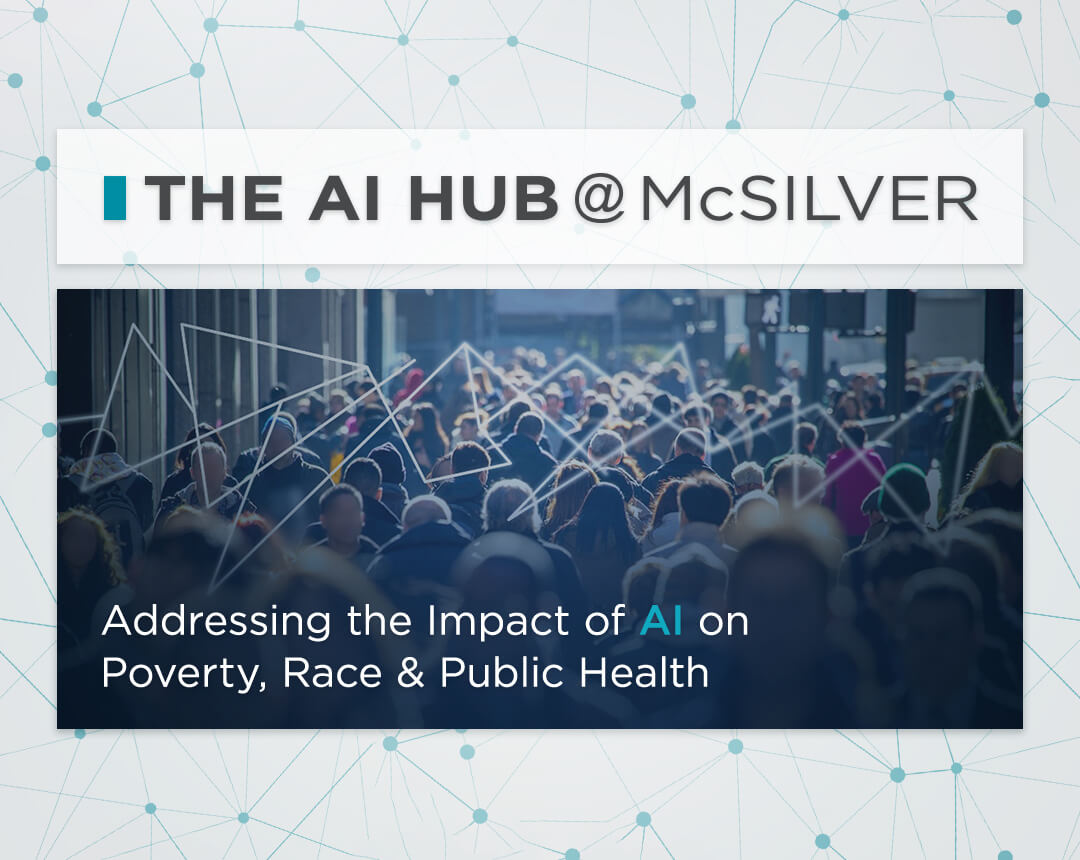
In January 2020, the New York State Office of Mental Health (OMH) tapped NYU McSilver to help develop strategies related to Black youth suicide prevention. Soon after, COVID-19 began to sweep the nation and a racial injustice reckoning galvanized multitudes. NYU McSilver evolved its work to meet both challenges. SRI introduced a new class for the Fall 2020 and Spring 2021 semesters that was part of NYU’s Big Ideas series. Led by Dr. Lindsey and former NYU Deputy Provost Dr. C. Cybele Raver, it focused on racial inequality in America.
Meanwhile, under the leadership of our Chief Program Officer Dr. Andrew F. Cleek, our Technical Assistance Centers seamlessly transitioned to an all-online training model. Also, our Clinical Education and Innovation Department adapted its trainings and resources to address telehealth services, back-to-school transition, and rising needs relating to mental health, child welfare and domestic violence in poverty-impacted communities.
In May 2021 our mental health policy efforts reached an important milestone when the U.S. House of Representatives passed H.R. 1475, the Pursuing Equity in Mental Health Act, on a bipartisan basis.
The following month, the Institute announced a transformational expansion of our work to address health disparities and racial inequity, with the establishment of the AI Hub at McSilver. Artificial intelligence tools are transforming the way our research is done, as well as impacting the populations we serve through our work. The Hub was established through a $5 million gift from Dr. Silver and her husband Martin Silver. Its mission is to harness AI technology to address health disparities and advocate for equity in the way AI is used in society.
Now, NYU McSilver enters 2022 with an exciting and expanded portfolio, as well as a continuing dedication to our mission of changing lives for the better.
AI Hub @ McSilver
The AI Hub at McSilver has been established to investigate how artificial intelligence-driven (AI) systems can be used to equitably address poverty and challenges relating to race and public health, and to provide thought leadership on the implications. This work has been made possible by a $5 million gift from philanthropists Martin Silver and Dr. Constance McCatherin Silver, which was announced in June 2021.
Our Work
- Investigate how AI systems can be used to equitably address poverty and challenges relating to race and public health.
- Provide national thought leadership on the implications of AI relating to race, public health and inequality.
- Build on the McSilver Institute’s work to answer whether AI can be used to better predict suicide rates and behaviors by race, geography, income and other demographic variables
- Develop additional innovative public health research and interventions using predictive analytics and other AI tools.
- Examine how data is gathered and processed for use by artificial intelligence and identify potential biases and inequities.
- Advocate for methods and policies that do not perpetuate inequities for people in underserved and marginalized populations.
- Help to advance NYU’s leadership in the use of AI to tackle complex social problems, in alignment with the university’s Strategies to Reduce Inequality initiative.
In November 2021, NYU McSilver co-hosted an online program about the use of predictive risk modeling in child welfare practice, in conjunction with Fordham University’s Graduate School of Social Service (GSS). Experts discussed the pros and cons of using these AI-enabled tools to predict which children and families are at risk for maltreatment.
Research
Developing evidence-based interventions to address poverty
Safe Mothers, Safe Children (SMSC)
Funder: NICHD
Principal Investigator: Michael A. Lindsey, PhD
This intervention seeks to reduce the risk of repeat child maltreatment through a multi-pronged intervention that enhances the identification, case management and treatment of mothers receiving preventive services.
The study intervention is adapted from Skills Training in Affective and Interpersonal Regulation (STAIR), which is designed to treat post-traumatic stress disorder (PTSD) and Parent-Child Interaction Therapy (PCIT) to foster positive parenting, reduce child maltreatment and enhance maternal and child well-being.
In response to conditions created by the COVID-19 pandemic, the study used teletherapy with its participants. In May 2021 it received funding of $3.5 million over 5 years in a R01 grant from the Eunice Kennedy Shriver National Institute of Child Health and Human Development, one of the National Institutes of Health.
Programs
Sharing practices for eradicating poverty
Clinical Education and Innovation
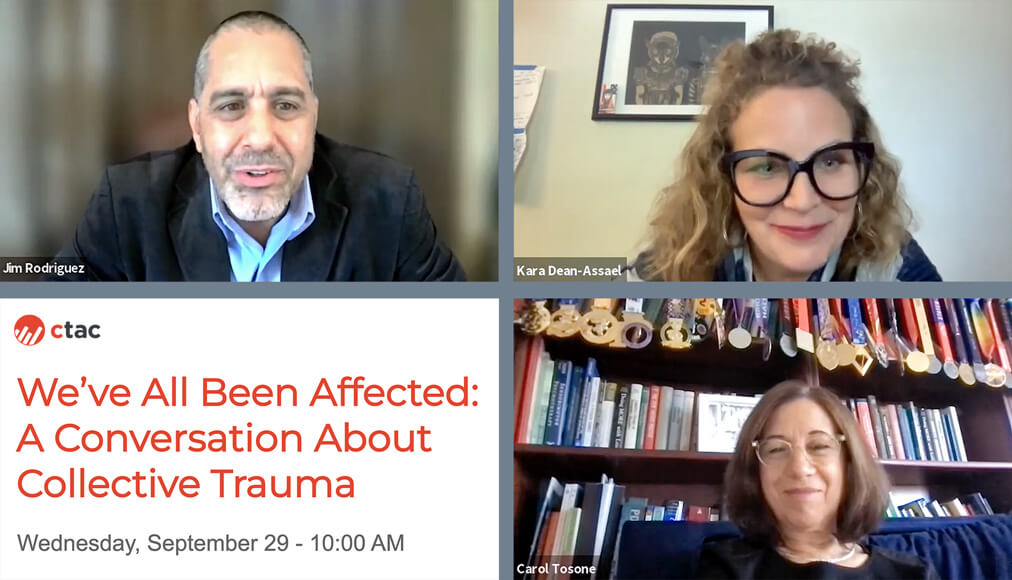
The Clinical Education and Innovation Department (CEID) focuses on a unique array of programs, trainings and tools to support practitioners and organizations working within poverty-impacted communities. To improve service delivery and business best practices within social service organizations, CEID uses a range of modalities based on the needs and learning styles of participants. These include in-person or online experiential trainings, learning communities, online self-paced courses, tool development and podcasts.
Some of CEID’s core trainings include:
- 4 Rs and 2 Ss for Strengthening Families, a curriculum-based practice designed to strengthen families, decrease child behavioral problems and increase engagement in care.
- Engagement Strategies for Child, Family and Adult Services, which focuses on best practices that can increase the initial and ongoing engagement of participants in services.
- Workforce Resilience, which provides helping professionals with tools to combat and cope with the myriad of social challenges they often experience through their work.
- Trauma-Informed Care, a strengths-based movement focused on providing services grounded in an understanding of the pervasiveness of trauma and its impact on children, youth, adults, families and communities.
- Social Determinants of Health and Mental Health, which are the factors that impact health and well-being and encompass every aspect of individuals’ lives.
- Anti-Oppressive and Anti-Racist Practices, which focus on issues of cultural humility, addressing microaggressions and exploring implicit bias.
- Family and Food Matters to Caregivers and Kids, a 7-week program to strengthen family relationships and promote healthy lifestyles within families at risk for food insecurity.
- Family and Food Matters to Pregnant Women, a 4-week nutrition and wellness program that helps to increase support and decrease challenges around having sufficient and healthy foods to eat.
In 2021, CEID collaborated with the NYC Administration for Children’s Services, Casey Family Programs, National Children’s Alliance, Project BEST in South Carolina, FPWA, Anthem, and University of Oklahoma to provide trainings on topics such as family-driven care, engagement and trauma-informed care.
Step-Up
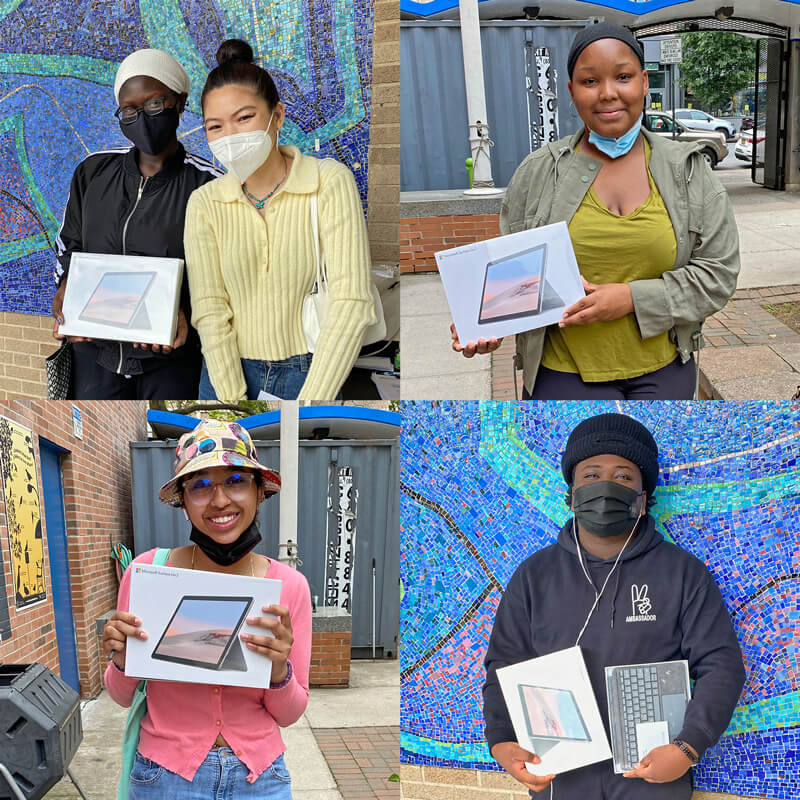
Step-Up has been a youth development and mental health support program funded by the Robin Hood Foundation and the New York City Department of Education that aims to promote social-emotional development, key life skills, academic achievement, high school graduation and a positive transition to young adulthood. The program was embedded within two New York City high schools located in East Harlem and the Bronx.
Developed by NYU McSilver in collaboration with the Center for Collaborative Inner-City Child Mental Health Services Research (CCCR) at the Mount Sinai School of Medicine, Step-Up was designed for youth experiencing significant environmental, academic, social and emotional challenges. It was a multi-component, youth-informed program that offered in-school life skills groups, one-on-one mentoring, mental health supports, structured opportunities for community service and leadership development.
The program provided supportive services for teens living within low-resourced communities to promote academic achievement and a positive transition to adulthood. It aimed to address ecological stressors that disproportionately affect Black and Latinx youth and their families who are impacted by poverty and violence. A June 10, 2021 article in Edutopia describes the importance of programs like Step-Up in the context of Black youth mental health.
Outcomes
Over the past 13 years, Step-Up has worked in partnership with youth, parents and staff out of 8 high schools. Most recently programming in two public high schools in the Bronx and East Harlem, the program has served over 800 students (35% Black, 50% Latinx, 15% other) and achieved a graduation rate of 98 percent, among many other positive educational and mental health outcomes.
Training & Technical Assistance
Applying research-derived knowledge to transform systems in New York State
The McSilver Institute-led Technical Assistance Centers (CTAC, MCTAC, TTAC and YTAC) are training, consultation and educational resources serving all mental health, substance use disorder and child welfare agencies in New York State, as well as infant and early childhood mental health providers throughout New York City. The Centers help agencies strengthen their clinical and business practices through training opportunities focused on implementing evidence-based practices and addressing the challenges associated with the recent changes in regulations, financing and overall healthcare reforms.
The TACs have worked closely with their funders to quickly adapt to the changing landscape brought on by the COVID-19 pandemic. The centers seamlessly transitioned to an all-online training model and provide critical training on the rapidly changing clinical and regulatory environment.
NYU McSilver continues to work in New York and nationally on a number of technical assistance, training and evaluation projects that involve multiple areas of expertise including: health homes/care management, social determinants of health screening, program evaluation, trauma-informed/resiliency-based care, managed care implementation, behavioral health business best practices, family peer support, engagement, value-based payments, payment reform and family-strengthening interventions. These projects cut across a broad array of stakeholders including behavioral health providers, city and state government, managed care organizations, IPAs (provider consortium) and universities.
Read more about Technical Assistance
The Community Technical Assistance Center of New York (CTAC)
Funder: NYS Office of Mental Health (NYS OMH)
Since 2011, CTAC has advanced the effective and efficient delivery of services to children, adults and families who rely on public sector services to meet their mental health needs. The Center offers a variety of trainings, tools and support to help improve direct services, program operations and development of the family and youth peer workforce. As well, CTAC has held 30+ webinars over the course of the pandemic to address the needs of the behavioral health community, all which are highlighted on our COVID-19 Resources page.

CTAC and MCTAC launched an updated version of their website ctacny.org in July. The new design featured an interactive search tool, new playlists and series pages as well as seamless integration with their numerous tools and resources. Our centers are proud that this new streamlined design will only further help over 70,000 users from behavioral health providers and other key stakeholders across New York state receive the training and resources to aid their communities.
The Managed Care Technical Assistance Center Of New York (MCTAC)
Funder: NYS OMH
MCTAC provides policy, administrative and implementation technical assistance to mental health, substance abuse and child welfare agencies transitioning to managed care and value-based payment systems. CTAC and MCTAC share a mission of helping agencies develop strong business and financial models to ensure sustainability in the changing healthcare landscape.
The NYC Early Childhood Mental Health Training and Technical Assistance Center (TTAC)
Funder: NYC Department of Health and Mental Hygiene
Partnership Lead: New York Center for Child Development
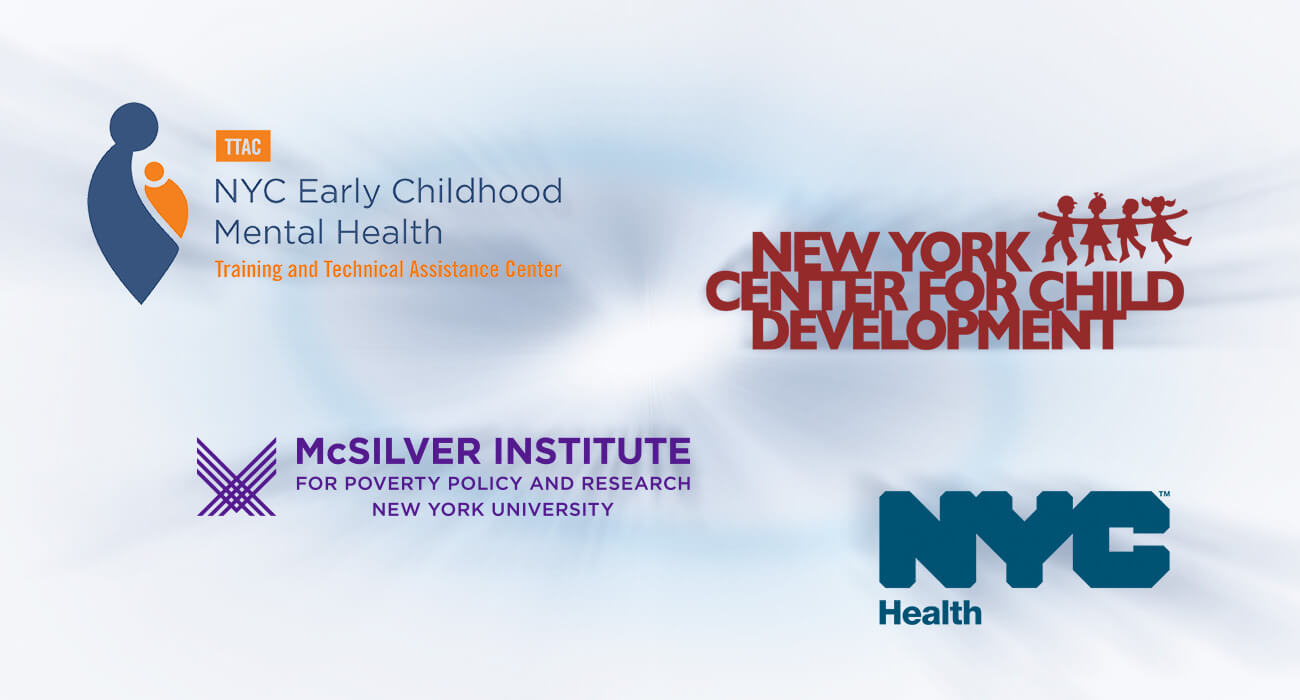
TTAC provides training and technical assistance to mental health professionals serving children ages 0–5 and their families in the New York City Department of Health and Mental Hygiene-funded Early Childhood Therapeutic Centers, as well as professionals working in: New York City outpatient mental health clinics; Early Intervention, Universal Pre-K and ACS Early Learn sites; and other child-serving systems.
TTAC launched a new website, ttacny.org in August to allow users to seamlessly filter, toggle and search through upcoming and archived content, trainings and resources. This center supports professionals who work with young children and expands New York’s capacity to promote positive mental health in the early years.
The YouthACT Technical Assistance Center (YTAC)
Funder: NYS OMH
NYU McSilver was awarded a multi-year addition to its CTAC contract in 2021 to provide training and technical assistance to 14 teams across New York State that will be the first to implement an Assertive Community Treatment (ACT) program for youth and their families. The YouthACT Technical Assistance Center (YTAC) will work with providers, NYS OMH, Families Together of NYS and the ACT Institute to prepare these teams to address the needs of youth with significant mental health challenges and their families.
Special Initiatives
Strategies to Reduce Inequality (SRI)
Persistent inequality requires an approach that is multidimensional to identify meaningful, sustainable solutions. To that end, New York University faculty across schools and disciplines have come together to work on the Strategies to Reduce Inequality (SRI) initiative. Highlights in 2021 include:

“Race and Inequality: Advancing Equity Through Policy and Practice” was offered Spring 2021 as part of the University-wide “Big Ideas” series In February and March, recipients of the 2019-2020 IHDSC Seed Awards spoke to the SRI group about their projects, including Drs. Luis Rodriguez, Richard Welsh, Sarah Cowman, Stephanie Cook and L’Heureux Lewis-McCoy.
- In March, the SRI group hosted a panel discussion titled “The Fundamentals of Receiving Federal Funding,” featuring Drs. Michael A. Lindsey, Gail D’Eramo Melkus, Pamela Morris and Joseph Ravenell.
- In April and May, Drs. Okhee Lee and Lindsey presented as part of the SRI group’s Grant Review Process Workshop series, which addressed demystifying the review process at NSF and NIH, respectively.
- In May, the SRI group hosted a virtual visit with Dr. Sandra Richardson, the National Science Foundation Acting Deputy Division Director for the Division of Undergraduate Education within the Directorate for Education and Human Resources (EHR). Dr. Richardson spoke about funding opportunities within the EHR, and how to develop competitive NSF proposals.
- During the spring semester, former NYU Deputy Provost Dr. C. Cybele Raver and Dr. Lindsey led NYU’s Big Ideas course series, which was a focused exploration of racial inequality in the U.S., featuring expert guests in law, public health, education, social work, policy and more.
- The New York City Reducing Inequality Network (NYC-RIN) is led by a group of scholars at New York University, Columbia University and the CUNY Graduate Center who have come together to foster dialogue and collaboration among scholars studying inequality around the city, with a particular focus on enhancing research opportunities and mentoring for doctoral students. NYC-RIN is funded by the William T. Grant Foundation, New York University, Columbia University and the City University of New York. In the Fall of 2021 Dominic Terrel Walker, a doctoral student in the Sociology department at Columbia University, became an Inequality Fellow. His research interests are broadly at the nexus of racial capitalism and the cultural politics of education.
Cross-Cutting Initiative on Inequality
The mission of this initiative is to reduce social and economic inequality by engaging in transformative scholarship and service and by developing a next generation of scholars and leaders seeking to understand and combat inequality. The collaboration with other universities and partners in government, business and nonprofits allows us to foster student, faculty and staff commitment to social impact.
A feature of the Cross-Cutting Initiative is NYU Blueprints for Progressive Change in Juvenile Justice. Children face profound and predictable disparities in their encounters with the legal system. Blueprints involve faculty working across disciplinary boundaries to address these disparities. In collaboration with policy and practice leaders, they develop and test research-based solutions to create lasting change in the lives of children and their families. The program is co-sponsored by NYU’s Institute of Human Development and Social Change (IHDSC) and the Strategies to Reduce Inequality initiative, and advances NYU’s mission to leverage rigorous scholarship toward social impact.
Last year, Blueprints received funding from Five Together Foundation and an anonymous source to develop interventions to reduce school pushout and improve re-entry into school for system involved youth. They created a policy and practice document detailing critical intersections between the juvenile justice system, child welfare system and education system in New York City. Now they are interviewing key stakeholders across these systems to collect and incorporate their perspectives on school pushout and re-entry and will launch a new advocacy program to support the educational rights of system-involved young people in Spring 2022.
Read more about the Cross-Cutting Initiative
Read more about NYU Blueprints
Saving Young Black Lives: Reversing Suicide Trends
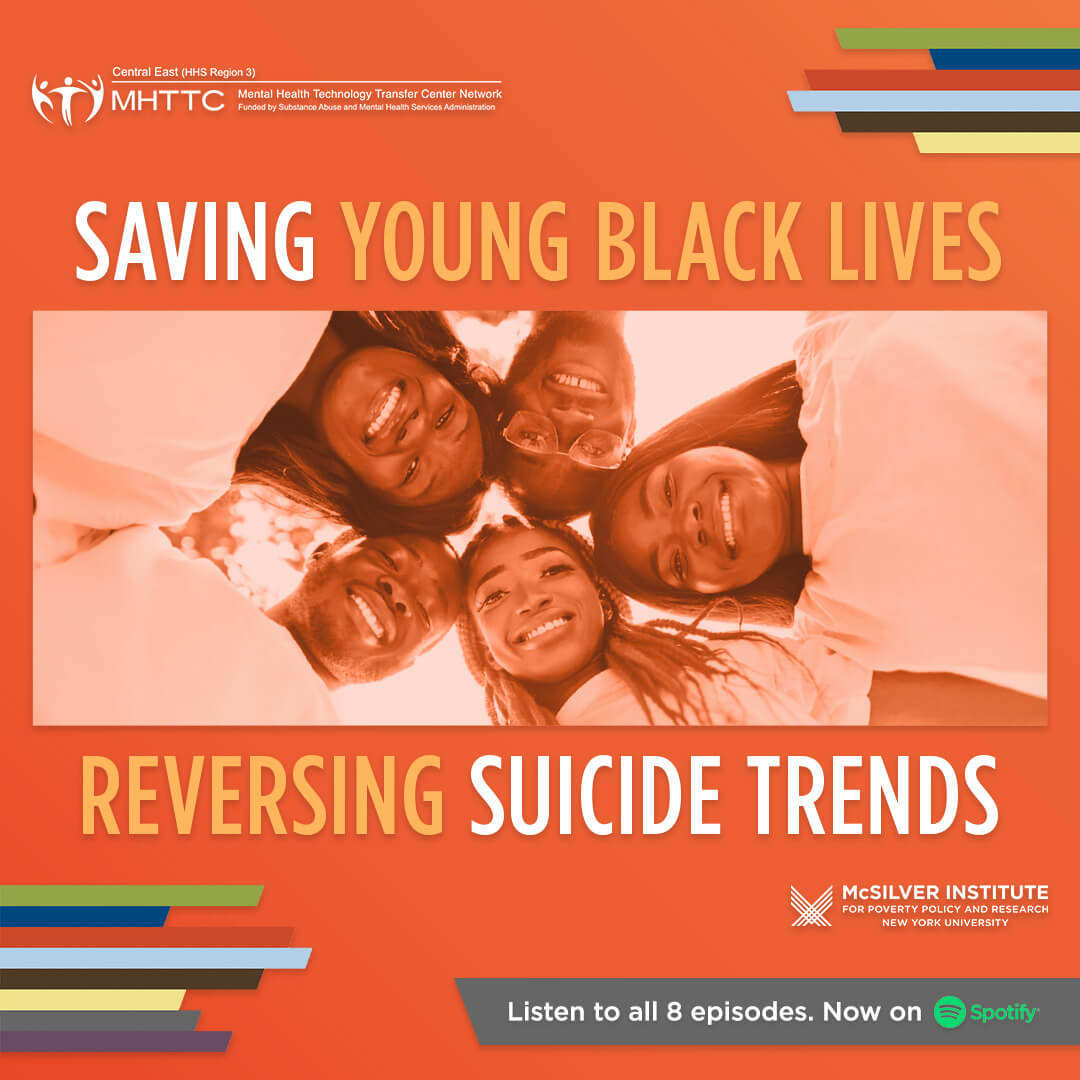
Our research has uncovered alarming trends in the mental health of our nation’s Black youth. To raise awareness about them, NYU McSilver partnered with the SAMHSA-supported Central East Mental Health Technology Transfer Center (Central East MHTTC) on a podcast series titled, Saving Young Black Lives: Reversing Suicide Trends. Launched during National Suicide Awareness Month, the 8-part series included interviews with survivor Mike Veny, parent Tami Charles, pro athlete Kenny Stills and mental health researchers and clinicians. Dr. Michael A. Lindsey, Executive Director of NYU McSilver, hosted the series. Listen to it on the Central East MHTTC website, Spotify or SoundCloud.
Read more about the podcast series
Mcsilver Fellows-in-Residence (2020-2021)
The McSilver Institute Fellowship engages nationally recognized poverty and social justice scholars across disciplines to conduct research projects, publish books and papers, conduct courses, and participate in seminars, conferences and workshops.
Henry L. Greenidge, Esq.
Henry L. Greenidge, Esq. is a 2020-2021 Fellow-in-Residence for the NYU McSilver Institute. His areas of expertise include sustainability, energy, infrastructure, broadband, and autonomous transportation. Greenidge is an Executive Vice President at Tusk Strategies, where he focuses on mobility and equity. He has led state and local government affairs, as well as public engagement for Cruise, a GM subsidiary focused on autonomous vehicles. Prior to that he was Program Examiner in the White House Office of Management and Budget during the Obama Administration, a Policy Advisor to the U.S. Secretary of Transportation and has held positions within the New York City Office of the Mayor and the NYC Department of Transportation.
Read more about Henry Greenidge
Gary S. Belkin, MD, PhD, MPH
Dr. Gary Belkin was formerly Deputy Health Commissioner for New York City, and most recently founded and leads the Billion Minds Institute. The Institute aims to bring policy and practical attention and change for taking on the “social climate” crisis of the climate crisis. He has implemented and advanced innovative approaches to mental health, especially those that integrate with and amplify other social and community capabilities, policies, and goals at scale. That included holding senior management positions in government and in large health and human service providers, advisory roles to US urban settings as well as national and local government partnerships globally, and work as a teacher and researcher.
Read more about Dr. Gary Belkin
Partnerships with Community Organizations
We can’t carry out our mission alone. Partnerships with community organizations are a vital part of our work to address poverty and inequality. The following organizations are among those who help us to ensure that we are reaching community members and centering their voices in our work. Highlights of our work with them in 2021 included a leadership talk with New York’s Attorney General, a street harassment training webinar, a discussion with a member of Congress about Haiti policy, a Martin Luther King Jr. Day forum about Black youth mental health and a voter education campaign about ranked-choice voting in New York City.
Greater New York Chapter of the Links, Inc. (GNY Links)
The Links, Incorporated, is one of the nation’s oldest and largest women’s volunteer service organizations, dedicated to enriching, sustaining and ensuring the culture and economic survival of African Americans and other persons of African ancestry. The Greater New York Chapter of the Links, Inc. is dedicated to supporting programs that enhance the well-being of families and senior citizens in the New York City area.
The Boys & Girls Club of Harlem (BGCH)
For over 40 years, the Boys & Girls Club of Harlem has proudly served Harlem youth and the community, providing access and opportunities for youth to reach their full potential as responsible members of the community.
The Haitian Roundtable (HRT)
HRT is a not-for-profit organization of Haitian-American professionals committed to civic engagement and strategic initiatives benefiting the Haitian community. The organization seeks to heighten awareness of Haitians as an important constituency among thought leaders and newsmakers, policymakers and institutions through partnerships, programs and events recognizing Haitian excellence.
The Committee for Ranked Choice Voting NYC (Rank the Vote NYC)
Rank the Vote NYC was founded in 2019 to bring ranked-choice voting to New York City. Once the voting method was adopted, they shifted to educating voters, candidates and campaigns and community groups on the upcoming changes to the city’s local elections in 2021.
American Foundation for Suicide Prevention (AFSP)
AFSP is a voluntary health organization that gives those affected by suicide a nationwide community empowered by research, education and advocacy to take action against this leading cause of death.
Policy & Civic Engagement
Our policy-advancing activities made significant impacts in 2021 on the constituencies that are the heart of our mission. They resulted in federal legislation and increased attention, at both the state and local levels, on the needs of underserved communities.
Black Youth Mental Health and Suicide Prevention
NYU McSilver’s mission to disrupt the root causes of poverty includes a focus on health inequities, particularly relating to trends in suicide and mental health disparities.
Since 2019, the Institute has been raising awareness about rising suicide attempt rates in Black youth with elected leaders, who in turn have pursued legislation for resources to address the problem. Rep. Bonnie Watson Coleman (NJ-12th) and the Congressional Black Caucus (CBC) have been important advocates at the federal level, through the CBC Emergency Taskforce on Black Youth Suicide and Mental Health. NYU McSilver Executive Director Dr. Michael A. Lindsey led a working group of experts who issued a seminal report to the taskforce, “Ring The Alarm: The Crisis of Black Youth Suicide in America.”
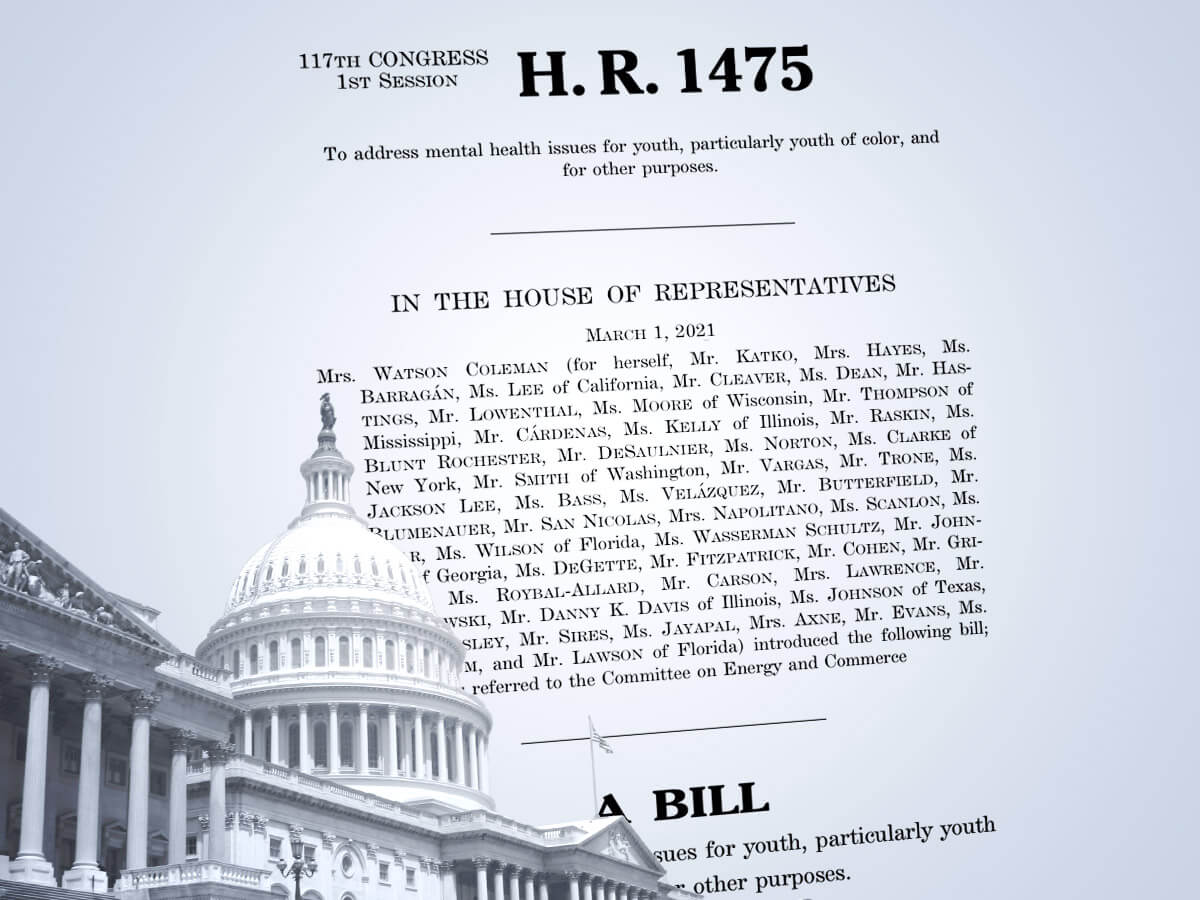
An important milestone in these efforts was reached in May when the U.S. House of Representatives passed the Pursuing Equity in Mental Health Act, co-sponsored by Rep. Watson Coleman (D, NJ-12th) and Rep. John Katko (R, NY-24th), on a bipartisan basis. It had passed the House last year and was reintroduced in the current Congress at the start of 2021.
In July, Dr. Lindsey addressed the crisis of Black youth suicide at the National Association of Social Workers’ White House Virtual Executive Briefing: Social Work is Essential. NASW invited him to join other leaders in the profession in a dialogue with policymakers in the Biden Administration about the future of social work and key social policy priorities.
Read more about suicide prevention
School-Based Mental Health Support
NYU McSilver’s policy work also focuses on disrupting the school-to-prison pipeline resulting from racial disparities in school-based mental health resources, coupled with discipline measures that too often address mental health problems in Black and brown youth with suspensions and expulsions.
In March, NYU McSilver submitted testimony to the New York City Council Committee on Mental Health, Disabilities and Addictions about Step-Up, our youth development and mental health support program serving New York City Department of Education schools. For over 12 years, Step-Up has helped transform the lives of at least 800 students, with a graduation rate of 98 percent. Testimony included the impact of the COVID-19 pandemic on the lives of high school students, and how Step-Up has addressed the challenges young people face.
Read more about school-based mental health
Ranked-Choice Voting
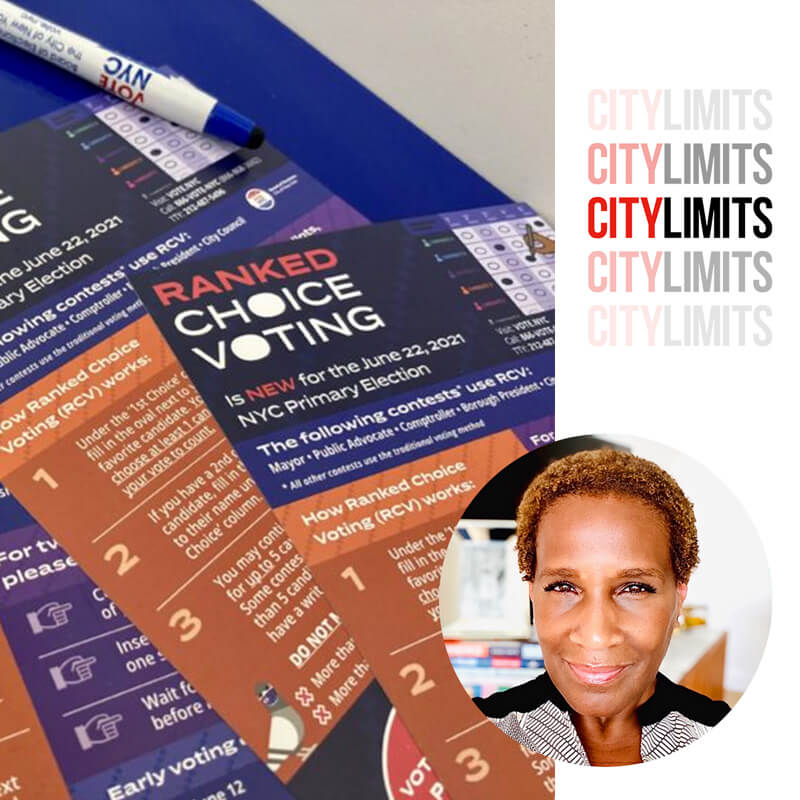
In 2019, New York City adopted ranked-choice voting for the first time in municipal primaries and special elections. The method allows voters to rank their top five candidates in order of preference. It gives voters more choice, while providing a more equitable path for candidates from Black, brown and low-income communities.
In 2021, NYU McSilver continued its partnership with the Committee for Ranked Choice Voting NYC (Rank the Vote NYC) in order to educate voters through organized outreach efforts and community forums. The Institute’s Chief Operating Officer Rose Pierre-Louis, who is also an Executive Board Member of Rank the Vote NYC, participated in these forums and also extended the reach of these efforts through op-eds published in City Limits and AM New York, as well as media coverage by the New York Post, Gotham Gazette and Bloomberg Radio.
Forums & Events
Fostering public dialogues and creating forums for thought leadership are critical to NYU McSilver’s mission. Each year we maintain a robust schedule of forums and speaking engagements in New York and nationally, in partnership with community organizations and leaders. Below are the highlights of our activity with community partnerships in 2021. See our Publications and Presentations section for additional event participation by NYU McSilver staff members.
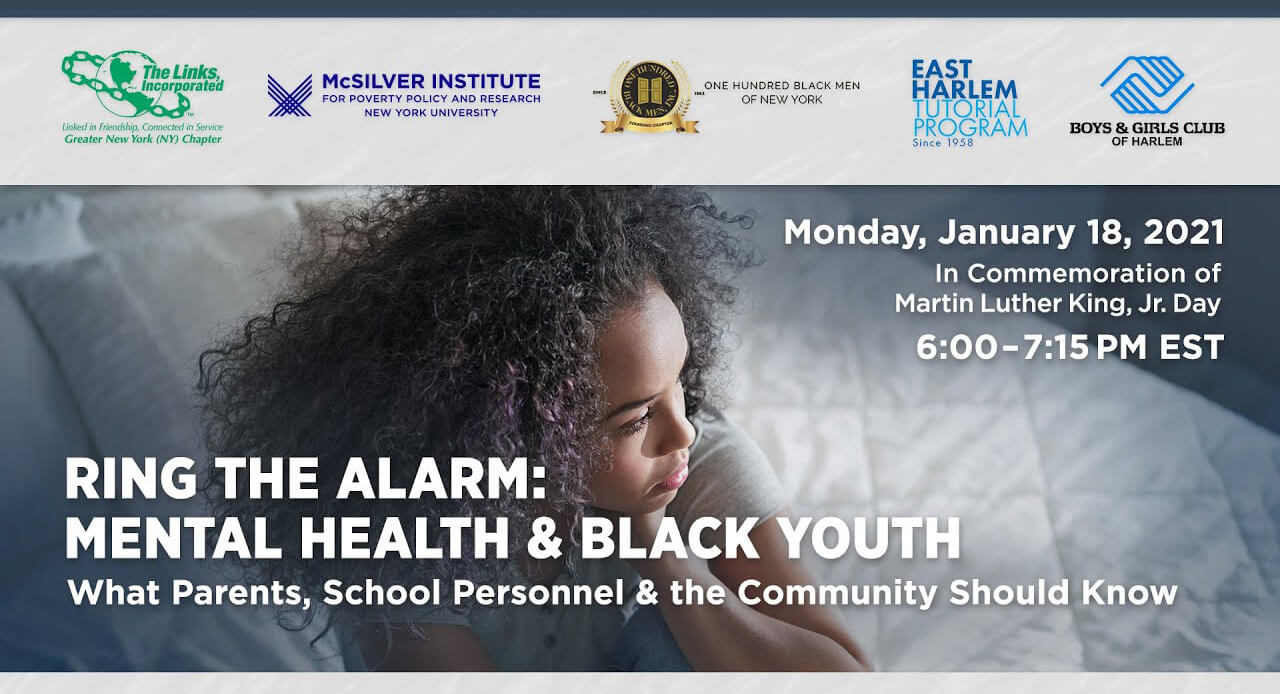
In commemoration of the Rev. Dr. Martin Luther King, Jr. National Holiday, a panel of experts convened virtually in January to talk about mental health trends and actions required to help Black youth thrive. Leading the discussion was Dr. Christina M. Greer, an Associate Professor at Fordham University and NYU McSilver 2018 Fellow-in-Residence. NYU McSilver Executive Director Dr. Michael A. Lindsey was a panelist, and the co-sponsors were The Greater New York Chapter of the Links, Inc. (GNY Links), East Harlem Tutorial Program, Boys & Girls Club of Harlem and One Hundred Black Men of New York.
Also that month, NYU McSilver Chief Communications Officer Sheryl Huggins Salomon moderated a forum with candidates for New York City Mayor that was focused on health equity. It was hosted by the Community Service Society.
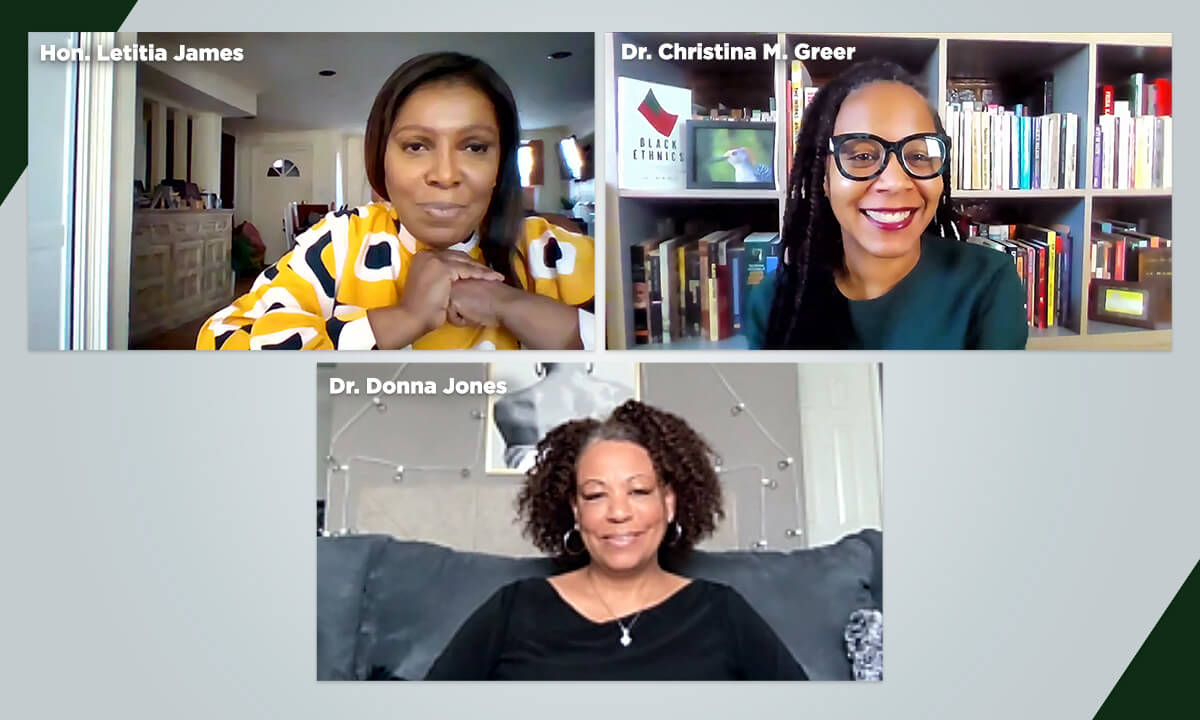
During Women’s History Month in March, New York Attorney General Letitia James was interviewed by Dr. Greer, during the inaugural program of the GNY Links’ “She Leads” series of conversations with Black women leaders. NYU McSilver co-hosted the virtual armchair discussion, which was followed by an audience Q&A.
Also in March, NYU McSilver and a coalition of community partners and elected leaders hosted a virtual community forum to address street harassment and other harassment in public spaces. U.S. Rep. Adriano Espaillat (NY-13th) and Manhattan Borough President Gale A. Brewer made opening remarks, and experts from Hollaback! presented a bystander intervention training. NYU McSilver Chief Operating Officer Rose Pierre-Louis moderated the discussion. The GNY Links and Hollaback! were lead co-sponsors.
Additionally, NYU McSilver and NYU Wagner Graduate School of Public Service co-sponsored an introduction to ranked-choice voting for the NYU community in March. Our COO Rose Pierre-Louis, who is an Executive Board Member of the Committee for Ranked-Choice Voting NYC, was among the presenters.
In May, Pierre-Louis shared information about the adoption of ranked-choice voting in New York City in a virtual town hall co-hosted by GenVote@NYU, the Undergraduate Law Review and NYU McSilver.
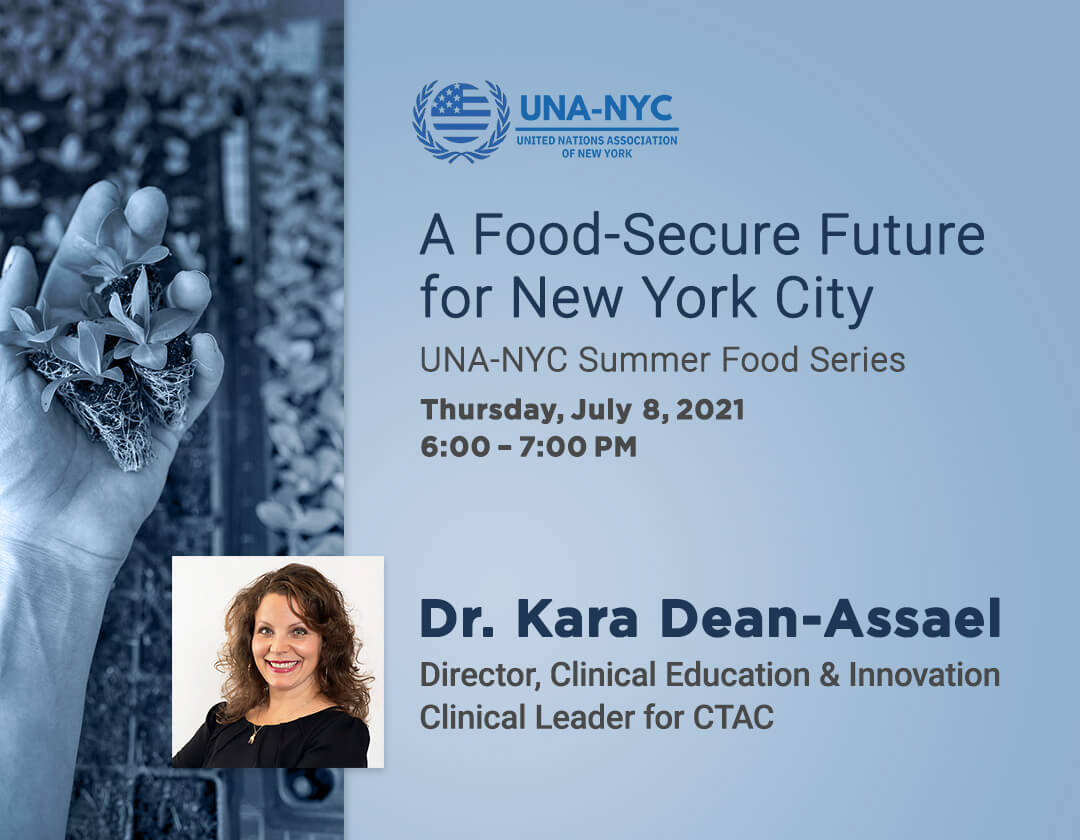
In July, the United Nations Association of New York City (UNA-NYC) hosted a virtual panel discussion about the wide-ranging effects of hunger in the city, moderated by McSilver Clinical Education and Innovation Department Director and Clinical Leader of CTAC, Dr. Kara Dean-Assael.
In June, the NYU McSilver-led Community Technical Assistance Center of NY (CTAC) hosted a presentation by Dr. Doris F. Chang, an Associate Professor at the NYU Silver School, to explore historical and contemporary examples of anti-AAPI racism and provide tools to address racial trauma and oppression.
In July, Dr. Lindsey addressed the crisis of Black youth suicide at the National Association of Social Workers’ White House Virtual Executive Briefing, titled “Social Work is Essential.” He joined other social work leaders in a dialogue with senior leaders in the Biden Administration about the future of social work and key social policy priorities.

Also in July, NYU McSilver, The Haitian Roundtable and Global Trauma Research co-hosted a healing conversation about coping with the political crisis impacting Haiti and the Haitian diaspora. Led by Drs. Jeff Gardere and Florence Saint-Jean, the virtual forum shared important tools for managing emotional trauma.
Finally, in October, Representative Gregory W. Meeks (NY-5th) Chairman of the U.S. House Foreign Affairs Committee, spoke about what’s next in Haiti and how the U.S. should help, during an online discussion that NYU McSilver co-hosted with The Haitian Roundtable.
McSilver in the News
NYU McSilver’s influence, expertise and thought leadership was reflected in far-reaching media coverage in 2021.
The establishment of the AI Hub at McSilver garnered mentions by The Chronicle of Philanthropy and The Imprint.
NYU McSilver continued to be a go-to resource for press due to its research and policy leadership relating to Black youth mental health and suicidality. Our Executive Director, Dr. Michael A. Lindsey, was interviewed by Scientific American, New York Times, New York Magazine, Time, CBSN—CBS News and Spectrum News/NY1.

A Kaiser Health News/Science Friday article for which he was interviewed was picked up by news outlets nationwide, including Medscape, WebMD, Philadelphia Inquirer, Dallas Morning News and Agencia EFE. Dr. Lindsey was also interviewed by actress and mental health advocate Taraji P. Henson for her Facebook Watch talk show, Peace of Mind with Taraji. Vox and Everyday Health spoke with him when prominent young athletes Naomi Osaka and Simone Biles began to prioritize their mental health over competition.
When ranked-choice voting was introduced in New York City elections, news outlets tapped the expertise of McSilver’s Chief Operating Officer, Rose Pierre-Louis, who is also an Executive Board Member of the Committee for Ranked Choice Voting NYC. Her op-eds were published in City Limits and AM New York, and her insights were shared by the New York Post, Gotham Gazette and Bloomberg Radio.
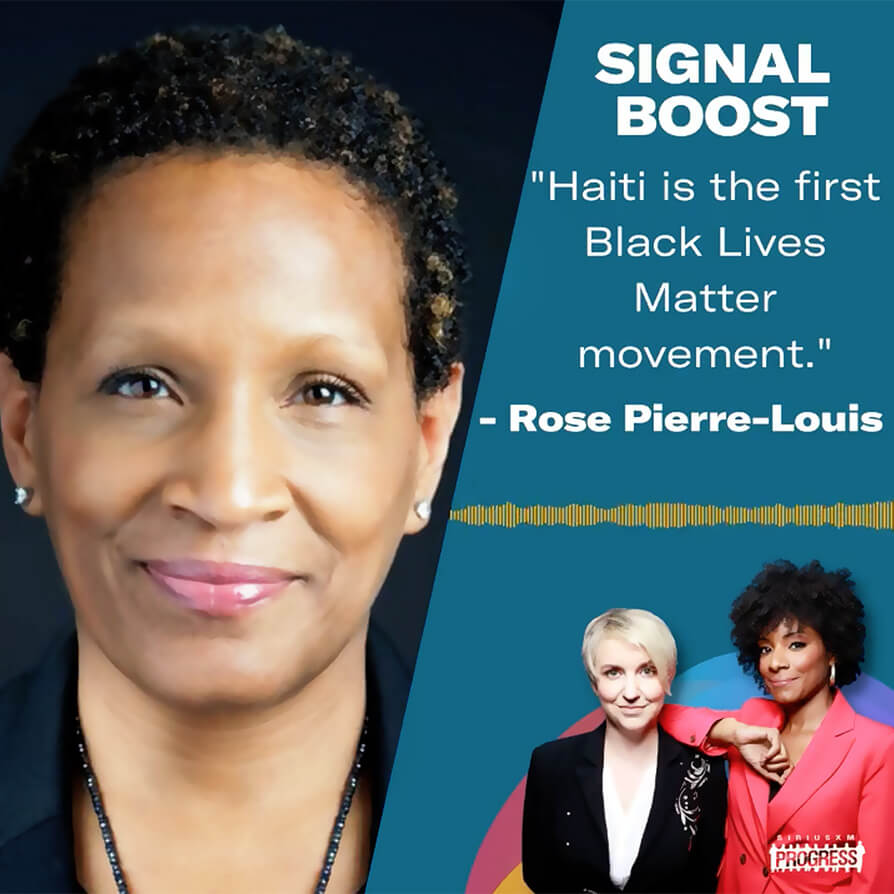
As crises mounted for Haiti in 2021, Spectrum News/NY1 and news show host Zerlina Maxwell turned to Pierre-Louis, who is also founder of The Haitian Roundtable, for context.
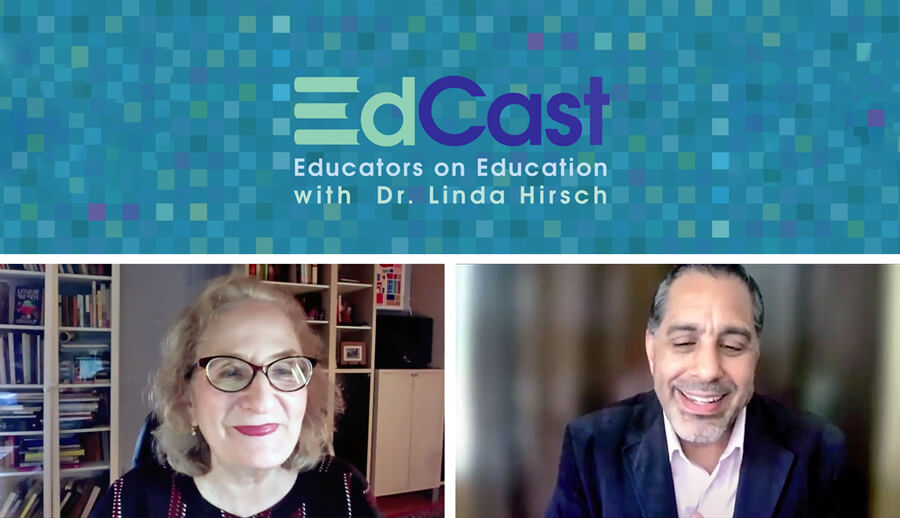
McSilver Director of Trauma-Informed Services Dr. James Rodriguez provided insights into the mental health of students, people in the Latinx community, masculinity and those seeking therapy for CUNY-TV Edcast, Verywell Mind, PsychCentral and Self. 2020-2021 McSilver Fellow-in-Residence Dr. Gary S. Belkin’s insights about the intersection of climate change and mental health were published in an op-ed in Psychiatric News.
Dr. Lindsey, Pierre-Louis and 2020-2021 McSilver Fellow-in-Residence Henry L. Greenidge were recognized in City & State New York’s Mental Health, Women’s 100 and Transportation Power lists, respectively.
See other news coverage of McSilver experts and their activities in our website’s Recent News section.
Facts & Figures
Our year, quantified
Current Staff

Number of staff members as of December 2021: 40
Number of interns as of December 2021: 13
Executive Team
- Michael A. Lindsey, PhD, MSW, MPH
- Andrew F. Cleek, PsyD
- Ammu D. Kowolik, LMSW, MPA
- Rosemonde Pierre-Louis, Esq.
- Frederica C. Stines, MA
Senior Leadership Team
- Lydia Franco, PhD, LMSW
- Andy Kwan, MPA
- Sheryl Huggins Salomon, MS
- Anthony J. Salerno, PhD
- Boris Vilgorin, MPA
All Staff
- Kelly Ancharski, MSW
- Diana Arias, MS, MSW
- Meaghan Baier, LMSW
- Geraldine Burton, FDC, FPA-C
- Caitlin Cronin
- Kara Dean-Assael, DSW, LMSW
- Nadege Diedrich
- Sarah Eisenstein
- Krystel Francis
- Ashley Fuss, LMSW, PhD
- Briana Gonçalves
- Priya Gopalan, MS, MSW
- Tracy Grogan, MS
- Jayson Jones, LMSW
- Debra Kaplan, PhD, LMSW
- Yvette Kelly, LMHC, MSEd
- Miles Martin, MUP
- Conner McCallum
- Mercedes Okosi, PsyD
- Aida Ortiz, FPA-C
- Patricia Quintero, MPA
- Tara Ready, LMSW
- Kassia Ringell, LCSW
- James Rodriguez, PhD, LCSW
- Kevin Sánchez
- Ilaha Sattar-Alam
- Carolina Vélez-Grau, PhD, LCSW
- H. Christian Villatoro, LMSW
- Janet Watson, FPA-C
- Martine Wisotsky, LMSW
Funding
![]()
External Sources (2021)
Federal Government Grants and Contracts
$5,218,000
Major Gift Initiative (AI Hub)
$5,000,000
Miscellaneous Income
$565,000
Foundations and Public-Private Partnerships
$337,000
External Funding Over Time (2012-2021)
Total dollar amount awarded in grants and other external funding since the establishment of McSilver.
$62 Million
Current Partner Organizations And Supporters
Benefactors
Constance and Martin Silver
Foundations
- Robin Hood Foundation
- W.T. Grant Foundation
- Five Together Foundation
- Kenworthy Swift Foundation
- Dreiseszun Family Foundation
- Casey Family Programs
Governmental Agencies
- National Institutes of Health
- New York State Office of Mental Health (OMH)
- New York State Office of Addiction Services and Supports (OASAS)
- New York City Department of Health & Mental Hygiene
- New York City Administration for Children’s Services
Non-profits, Academic Institutions and Corporations
- Alliance Health
- CCSI
- Citizen Advocates
- Coordinated Behavioral Care
- CPI/RFMH
- Danya Institute
- Families Together & Youth Power of New York State
- FPWA
- Georgetown University
- Mercer
- NAMI NYC Metro
- National Children’s Alliance
- NY Alliance for Inclusion and Innovation
- NYAPRS
- NYCCD
- NYU Langone—IDEAS Center
- Services for the Underserved
- The New York Foundling
- University of Oklahoma
Publications & Presentations
Research disseminated in print, online and in person
Publications
Acri, M.C., Hamovitch, E., Kuppinger, A., and Burger, S. (2021). Parent Peer Models for Families of Children with Mental Health Problems. In, J. Avery (Ed.), Peer Support in Medicine: A Quick Guide. Switzerland: Springer. ISBN: 978-3-030-58659-1
Cohen, D., Lindsey, M.A., Lochman, J. (2021) Applying an Ecosocial Framework to Address Racial Disparities in Suicide Risk Among Black Youth. Psychology in the Schools. doi: 10.1002/pits.22588.
Fong, H.F., Lindsey, M.A., Cruz-Gonzalez, M., Beardslee, W., Alegria, M. (2021) Racial/Ethnic Disparities in Depression Treatment for Caregivers Investigated by the US Child Welfare System. Academic Pediatrics. doi: 10.1016/j.acap.2021.02.004.
Fuss, A.A., Bloch, H.I., Dean-Assael, K., Kutner, M., Baier, ME, Ready, T., Vilgorin, B., Hannibal, L., Fortune, J., Cerrato, C., Nyreen, J. (2021) Supporting Families Struggling with Food Insecurity during the COVID-19 Pandemic: An Innovative Cross-Sector Collaboration. Social Work in Health Care. doi: 10.1080/00981389.2021.1904318.
Romanelli, M., Abay, L, & Ancharski, K. (2021). Mental Health Supports for Transgender and Gender Expansive Youth. In G. Mallon & J. Shelton (Eds.), Social Work Practice with Transgender and Gender Expansive Youth, 3rd edition. New York: Routledge. ISBN: 9780367277482
Romanelli, M., Sheftall, A.H., Irsheid, S.B., Lindsey M.A., Grogan, T. (2021) Factors Associated with Distinct Patterns of Suicidal Thoughts, Suicide Plans, and Suicide Attempts Among US Adolescents. Prevention Science. doi: 10.1007/s11121-021-01295-8.
Sheftall, A.H., Vakil, F., Ruch, D.A., Boyd RC, Lindsey, M.A., Bridge, J.A. (2021) Black Youth Suicide: Investigation of Current Trends and Precipitating Circumstances. Journal of the American Academy of Child and Adolescent Psychiatry. doi: 10.1016/j.jaac.2021.08.021.
Vargas, L., Vélez-Grau, C., Camacho, D., Richmond, T.S., Meisel, Z.F. (2021) The Permeating Effects of Violence on Health Services and Health in Mexico. Journal of Interpersonal Violence. doi: 10.1177/0886260521990832.
Xiao, Y., Lindsey, M.A. Adolescent Social Networks Matter for Suicidal Trajectories: Disparities across Race/Ethnicity, Sex, Sexual Identity and Socioeconomic Status. Psychological Medicine. doi: 10.1017/S0033291721000465.
Xiao, Y., Lindsey, M.A. Racial/Ethnic, Sex, Sexual Orientation, and Socioeconomic Disparities in Suicidal Trajectories and Mental Health Treatment Among Adolescents Transitioning to Young Adulthood in the USA: A Population-Based Cohort Study. Administration and Policy in Mental Health. doi: 10.1007/s10488-021-01122-w.
Presentations
Belkin, G.S. COVID-19 Lessons for Population Mental Health (Presenter). Columbia Mailman School of Public Health, The Dean’s Grand Rounds on the Future of Public Health, New York. April 2021. Virtual.
Belkin, G.S. The Human Impact of Climate Change: Mental Health, Mobility and Our Changing Planet (Speaker). The New School, New York. April 2021. Virtual.
Cleek, A.F. and Vilgorin, B. Behavioral Health Crisis: Impact of Covid-19 on Suicide and Overdose in the Medicaid Population. Medicaid Managed Care Leadership Summit, RISE. April 2021. Virtual.
Cleek, A.F. and Vilgorin, B. It’s All About the Contract — Best Practices in Negotiations (Presenters). NATCON21, National Council for Behavioral Health, District of Columbia. May 2021. Virtual.
Dean-Assael, K. A Food-Secure Future for New York City (Moderator). UNA-NYC Summer Series: Sustainable Food Systems in New York and the World, United Nations Association of New York. July 2021. Virtual.
Greenidge, H. Human-centered Design of Safe and Affordable Driverless Mobility (Moderator). Smart Car Driving Summit, Princeton University, New Jersey. March 2021. Virtual.
Greenidge, H. Equity and Mobility (Panelist). 2021 Knight Smart Cities Lab, Knight Foundation, Florida. July 2021. Virtual.
Lindsey, M.A. Suicide Loss in our African American and Black Communities (Panelist). American Association of Suicidology Conference. February 2021. Virtual.
Lindsey, M.A. Saving Our Sons: A Closer Look at Suicide in Black and Latino Boys (Panelist). Healing Conversations, The H.O.P.E. Center Harlem, New York. March 2021. Virtual.
Lindsey, M.A. The State of Black New York: Bridging the Digital Divide (Panelist). New York Urban League, New York. April 2021. Virtual.
Lindsey, M.A. Are We Missing Signs of Suicidality in Black Youth? (Keynote Speaker). Southeastern School Behavioral Health Community, South Carolina. April 2021. In person.
Lindsey, M.A. How Can We Help? Understanding Warnings of Suicidal Behavior Among Black Youth (Keynote Speaker). Pediatric Academic Societies 2021, Society for Pediatric Research, Texas. May 2021. Virtual.
Lindsey, M.A. Preventing Suicide in the African American Community (Presenter). NATCON21, National Council for Behavioral Health, District of Columbia. May 2021. Virtual.
Lindsey, M.A. How Can We Help? Understanding Warnings of Suicidal Behavior Among Black Youth (Keynote Speaker). Racial Reckoning: True Equity in Mental Health Summit. New Mexico Black Leadership Council. May 2021. Virtual.
Lindsey, M.A. The Rest of Us: Fostering Mental Health Among College Students of Color (Panelist). Central East Mental Health Technology Transfer Center Network, Maryland. June 2021.
Lindsey, M.A. Preventing Suicide in Communities of Color (Presenter). Advocacy Forum, American Foundation for Suicide Prevention, New York. June 2021. Pre-recorded. June 2021.
Lindsey, M.A. Social Work is Essential (Briefer). White House Virtual Executive Briefing, National Association of Social Workers, District of Columbia. July 2021. Virtual.
Lindsey, M.A. Overlooked Signs of Suicidality in Black Youth (Presenter). Arizona Suicide Prevention Hope Conference, Arizona Suicide Prevention Coalition, Arizona. October 2021. Virtual.
Lindsey, M.A. Suffering in Silence: Identifying Suicidal Behavior in Black Youth and Creating a Research, Policy and Practice Agenda (Keynote Speaker). John R. Lutzker Lecture Series 2021, Georgia State University School of Public Health, Georgia. September 2021. Virtual.
Lindsey, M.A. Overlooked Signs of Suicidality in Black Youth (Presenter). Arizona Suicide Prevention Hope Conference, Arizona Suicide Prevention Coalition, Arizona. October 2021. Virtual.
Lindsey, M.A. Overlooked Signs of Suicidality in Black Youth (Presenter). International Society for Traumatic Stress Studies Annual Meeting, ISTSS, Illinois. November 2021. Virtual.
Okosi, M. A Way Forward: A Mental Health Response to #Endsars and Other Community Crises (Panelist). Coalition for the Advancement of Nigerian Mental Health. February 2021. Virtual.
Pierre-Louis, R. Ranked-Choice Voting Educational Panel with Rank the Vote NYC (Panelist). Queens Public Library, New York. January 2021. Virtual.
Pierre-Louis, R. Breakfast Briefing on Ranked-Choice Voting (Panelist). Citizens Union Civic Conversations, New York. February 2021. Virtual.
Pierre-Louis, R. In Conversation: Civics 101 (Presenter). New York City Black Women’s Political Club. February 2021. Virtual.
Pierre-Louis, R. The Reckoning: The Role of Women and Girls of Color in Our Nation’s Past, Present, and Future (Panelist). Oliver Scholars CEO Salon, New York. March 2021. Virtual.
Pierre-Louis, R. Pricing Out Mom & Pop: How Does the Changing Housing Market Affect Small Businesses? (Panelist) Manhattan Community Board Six, New York. March 2021. Virtual.
Pierre-Louis, R. #BlackWomenVoteNYC (Panelist). Higher Heights, New York. April 2021. Virtual.
Pierre-Louis, R. Ranked-Choice Voting Information Session (Speaker). Manhattan Borough President’s Office, New York. May 2021. Virtual.
Rodriguez, J.A. Looking at Mental Health Through a Trauma Responsive Lens (Presenter). Adoptive and Foster Family Coalition of New York Annual Conference, New York. May 2021. Virtual.
Rodriguez, J. A., Reid, L., and Green. C. Promoting and Anti-Racist and Anti-Oppressive Culture in Your Organization (Presenter). 2021 Rehabilitation and Recovery Academy, New York. November 2021. Virtual.
Salerno, A. Resilience: The Missing Piece in Developing a Comprehensive Trauma Informed Approach (Presenter). Conference of the Association of Community Living Agencies in Mental Health, Lake George, New York. In-Person.
Salomon, S.H. The Race for Mayor 2021: Addressing Equity in Health Care During COVID-19 and Beyond (Moderator). Community Service Society NYC Mayoral Forum. January 2021. Virtual.
Salomon, S.H. Diversity in New York (Moderator). City & State New York Diversity Summit. February 2021. Virtual.
